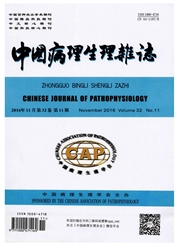

 中文摘要:
中文摘要:
目的:了解低压缺氧预处理是否能够诱导小鼠海马神经元产生延迟预适应,增强神经元耐缺氧能力。方法:将近交系Babl/c小鼠放入减压舱,模拟海拔7000m高度减压2.5h/d,连续3d。第3次减压毕36h后,观察严重低压缺氧(12000m4h)、严重缺血(双侧颈总动脉阻塞18min)、缺血合并低压缺氧(结扎右侧颈总动脉后,低压缺氧80(10m4h)对低压缺氧预处理及正常对照小鼠海马神经元的损伤情况。结果:7000m 2.5h低压缺氧预处理对小鼠海马神经元无显著损伤,能够诱导其产生延迟预适应,显著增强海马神经元耐受严重低压缺氧、严重缺血、缺血合并低压缺氧损伤的能力。结论:本研究所采用的低压缺氧预处理方法能够诱导海马神经元产生延迟预适应,增强其抗缺血缺氧能力。
 英文摘要:
英文摘要:
AIM: This study was designed to investigate the protective role of hypobaric hypoxic pretreatment (HHPT) on hippocampal neurons in Babl/c inbred mice. METHODS: HHPT was produced by simulating a 7 000 m high altitude 2.5 h/d for 3 d. At 36 h after last time decompression, three subgroups consisted of both the control and pretreatment mice were subjected to the 12 000 m high altitude hypobaric hypoxia for 4 h, the severe ischemia produced by bilateral common carotid artery occlusion for 18 min, and the severe ischemia/hypoxia produced by permanently ligation of right lateral common carotid artery followed by a 8 000 m high altitude hypobaric hypoxia for 4 h, respectively. The extents of protection to hippocampal CA1 neurons by HHPT were evaluated by accounting the number of intact neurons between HHPT and control group. RESULTS: The results indicated that HHPT protected hippocampal neurons against severe hypobaric hypoxia, severe ischemia, and ischemia combined with hypobaric hypoxia. CONCLUSION: Hypobaric hypoxic pretreatment induces a delayed protection to hippocampal neurons against hypoxic and ischemic injuries.
 同期刊论文项目
同期刊论文项目
 同项目期刊论文
同项目期刊论文
 期刊信息
期刊信息
